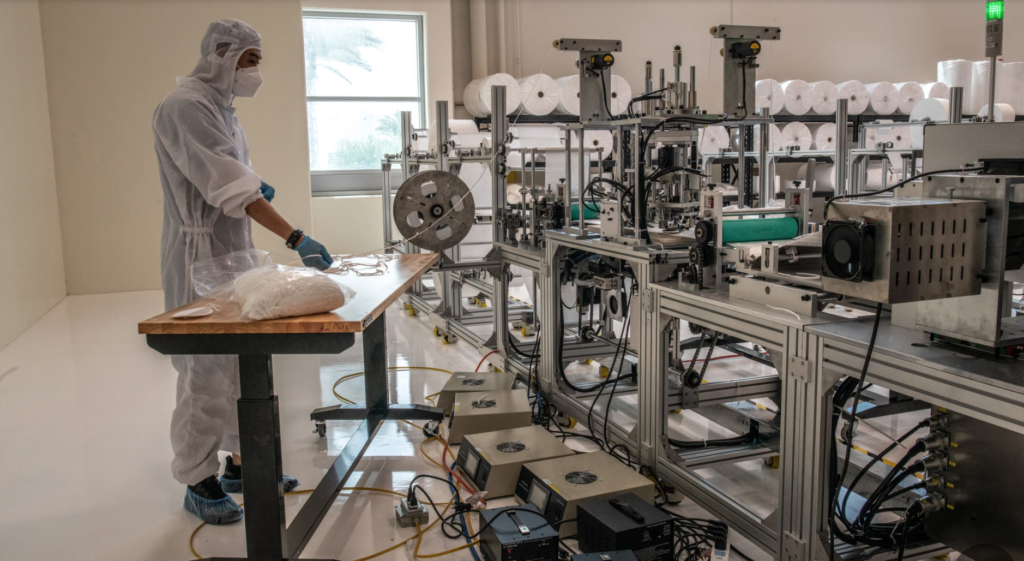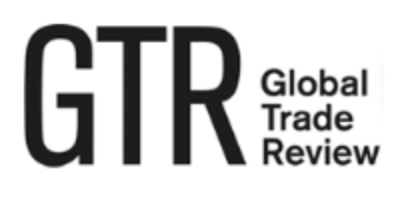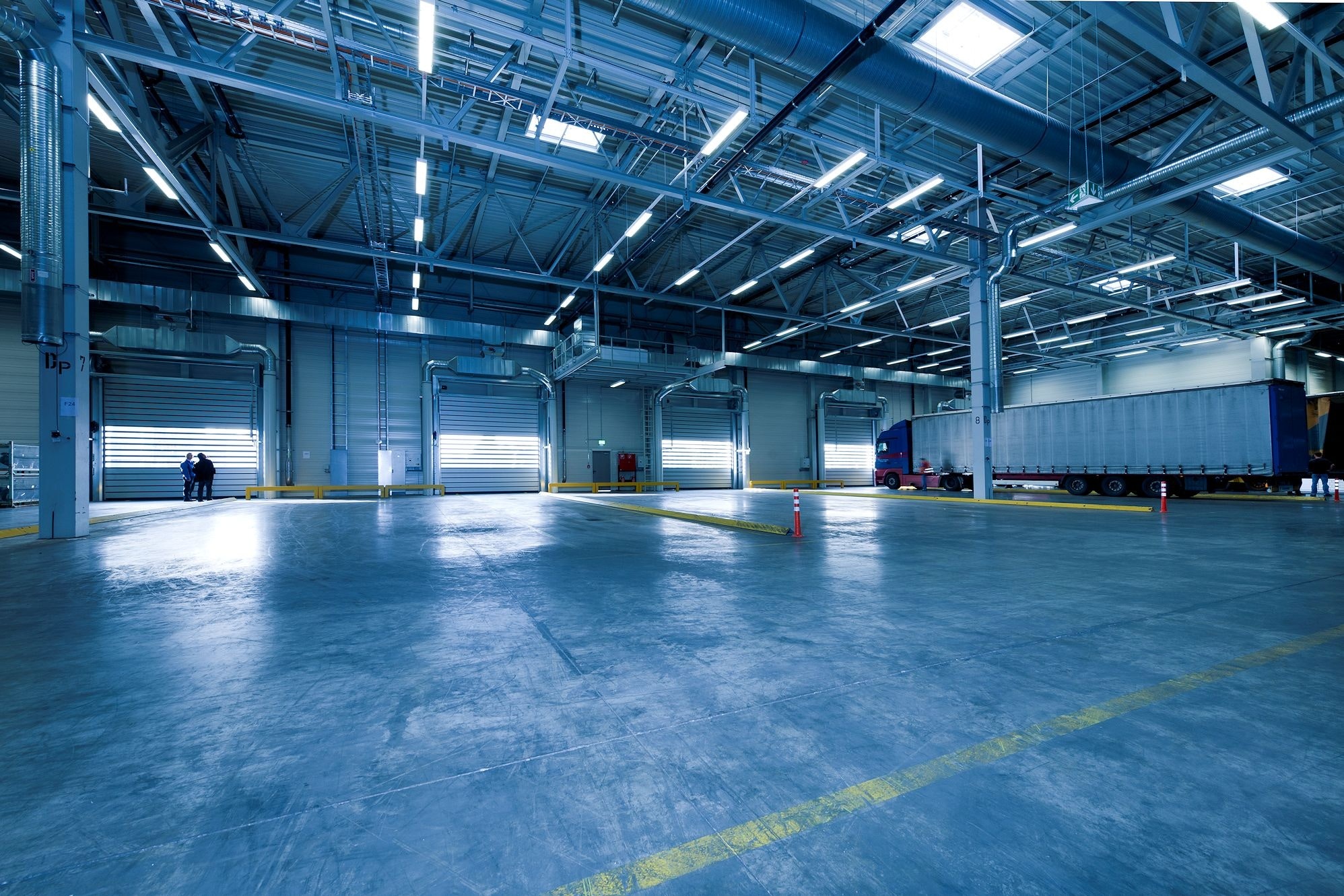US President Donald Trump says he may seek damages from China over the Covid-19 pandemic and is doing some “serious investigations” into the spread of the virus. The comments come as China tightens its export restrictions on medical supplies, and the US struggles to import critical personal protective equipment (PPE).
“We are not happy with China,” said Trump at a White House briefing this week, adding that he thinks the country could have stopped Covid-19 at the source.
QYK Brands mask production in Garden Grove, Calif.
The US president also responded to a question about Bild, a German newspaper, which allegedly sent an invoice to China to pay Germany billions of euros in economic damages done by the virus, with the editor believing China to be the cause of the outbreak. “Germany is looking at things, we are looking at things,” he said. “We are talking about a lot more money than Germany’s talking about.”
US and China relations had arguably become more amicable in recent months. In January, the two nations agreed a phase one trade deal that saw Trump relax some of the tariffs imposed on China during the trade war – which had resulted in months of tit-for-tat trade measures since 2018 – in return for China agreeing to purchase more US goods.
Trump’s latest comments come as trade of critical medical gear, particularly personal protective equipment, largely manufactured in China and needed to protect healthcare workers from catching and spreading Covid-19, faces export and import restrictions, and supply chain bottlenecks.

QYK Brands making KN95 Masks
A report by the Peterson Institute of International Economics (PIIE), a US-based think tank, published in March, revealed that US$3.3bn in imports of critical healthcare products from China still face 7.5% tariffs in the US, while US$1.1bn of imports that could potentially treat Covid-19 remained subject to 25% tariffs, despite the US taking the decision to temporarily cut and suspend some tariffs.
“Trump’s tariffs have disrupted the American healthcare system’s access to medical products, just when they are needed the most in 2020,” writes Chad Brown, author of the report.
Meanwhile, at the start of April, the US administration invoked the Defense Production Act – a law passed in 1950 that gives the government more control of industrial production in emergencies – to acquire an adequate number of N95 respirators from US manufacturer 3M and its subsidiaries. The US and 3M have since reached a deal.
“If shortages deepen globally, medical suppliers in China and elsewhere made wary by the Trump administration’s trade policy are likely to consider American buyers their last choice for sales,” adds Brown.
Peter Quinter, US customs and international trade attorney at Florida-based law firm GrayRobinson, tells GTR that the US’ relationship with China remains “poor”, and that a pandemic should see co-operation in trade and not criticism.
Politics, a pandemic and PPE
China has tightened restrictions on the export of masks and other personal protective equipment in recent weeks, calling for goods to be subjected to mandatory customs checks. The new measures follow complaints of faulty PPE gear from some governments and hospitals that imported equipment from China.
However, Rakesh Tammabattula, CEO of QYK Brands, a California-based company that imports medical supplies and PPE from China, says that imposing mandatory inspections in China are causing bottlenecks and cutting off manufacturers certified to export.
“There have been many restrictions imposed by the Chinese government in the past three or four weeks that highly restrict the movement of PPE outside of China, they are only letting a handful of companies export the finished PPE products, or the raw materials to make them,” he tells GTR. “We are finding it difficult to import in recent days, mainly because of the export restrictions the country has placed. That has been a major barrier and even the US government is facing the same issues.”
Meanwhile, US-based lawyer Quinter believes the inspection measures are a necessity: “Before the shipment leaves, they [Chinese customs] verify that the merchandise is from a list of authorised manufacturers, so they know that the quality or standard of the product is good and not counterfeit or substandard. That way importers in the US or UK know that they’re getting high-quality products, and that’s the kind of leadership that is needed.”
Substandard and phony PPE gear has indeed become an issue. Beijing recently confiscated more than 89 million poor quality masks and 418,000 pieces of protective equipment, said Gan Lin, deputy director of the State Administration of Market Regulation, at a press briefing this week.
However, Tammabattula speculates that there could be other motives for the restrictions. They are “not just about the quality, there are other reasons, one of which is to take control of the situation.” He says that China’s restrictive measures don’t match its reasoning, as there are many factories in China that produce high-quality medical products and which aren’t being allowed to export on the basis of poor quality products, adding “some of these companies have achieved a really high testing score and certification.”
The PIIE, however, says that China “was not voluntarily holding back PPE exports to the United States and the rest of the world, as was widely feared”, for the months of January and February.
Tammabattula also says that the world is relying on China to supply the raw materials to manufacture PPE, which has led to rationing and massively inflated prices.
Earlier this month, Janez Lenarčič, the EU’s crisis management commissioner, said at a press briefing: “There is a global scramble for personal protective equipment and for other types of medical equipment,” adding that it has become “difficult to arrange an orderly procurement” for PPE gear.
Quinter says he has seen an increasing number of businesses importing PPE products pop up in the US. “We have five clients involved in the importation of PPE, mostly from China. What’s interesting is that three of those companies didn’t even exist a few months ago, they were created for the purposes of importing PPE. One of the companies existed, but they used to import mobile phones.”
The lawyer says any increase in prices is a result of “supply and demand” and is not a problem, as prices will decrease once the pandemic eases.
It is too soon to say what the long-term impact will be on China-US relations, but any optimism that might have been in place since the phase one deal was agreed has been dampened.
By Maddie White
(This article was originally published on Global Trade Review on April 29, 2020.)

